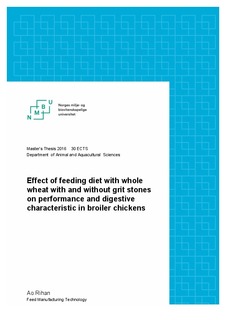| dc.description.abstract | An experiment was conducted to study the effect of feeding the diet with whole wheat with and without grit on broiler performance and digestive characteristics. The trial consisted of four treatments: one control and three grit treatments.250 1-day-old broilers were randomly placed in four pens. Commercial starter diets were fed from 1 to 10 days of age, commercial grower diets from 11 to 18 days of age and starter diet containing 15 % of whole wheat from 18 to 21 days of age. From five days of age, four birds were randomly placed in each of 48 cages. Birds in 12 cages were given no grit, zeolite grit, granite grit or marble. The grit was given on top of the feed at 5, 7 and 9 days of age, and each cage was offered 38 g each type of grit in total. On day 18, 19 and 20, one gram of each type of grit has given per bird in each treatment. At 5, 11, 13, 18 and 21 days of age, feed intake and body weight were registered. At 13, 18 and 21 days of age, one randomly selected bird from each cage was killed and dissected. The gizzard and crop content were collected and frozen for later analysis. Empty gizzard weight and full gizzard weight were weighed. The small intestine was also collected and frozen. At 11, 13, 18 and 21 days of age, the excreta was collected for analysis of particle size distribution of grit and excreta. On day 21, six birds from each treatment were given 50 g whole wheat after fasting 10 hours. After giving feed for 2 hours, small amount of excreta was collected and the whole wheat was measured. The amounts of whole wheat in different digestive segments that form 21 days of age were measured. The findings showed grit supplementation did not impair nor improve broiler overall performance compared to control treatment. Gizzard weight and gizzard content weight were not increased due to providing grit except heavier gizzard was observed at 13 days of age in granite group compared to control group. Gizzard ph was not affected by grit addition. The proportion of larger excreta particle size (>1.4mm) and smaller particle size (<0.2) fraction were not influenced by grit. No significant difference in the proportion of whole wheat grinded in the gizzard between the grit group and the control group. | nb_NO |

